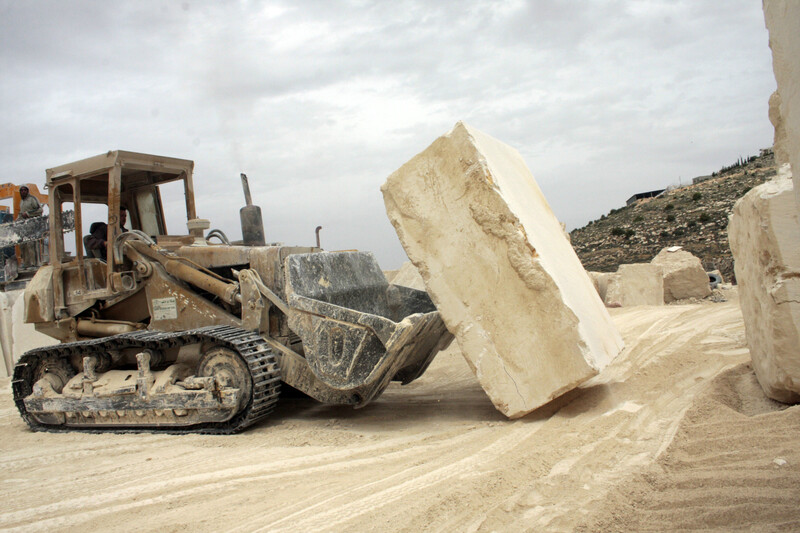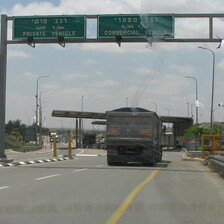The Electronic Intifada Ramallah 7 February 2012

Israel claims its exploitation of West Bank land benefits the Palestinian population.
APA imagesPillage: for some the word conjures up lawless warfare, a time before the order of nation states or the rule of international law. Indeed, in its petition to the Israeli high court, the Israeli human rights group Yesh Din argues that “pillage” belongs to “ancient times,” when justice was determined by might and the victors of war were entitled to the fruits of the conquered land.
But in today’s world, pillage continues. Obscured in the thick mire of economic agreements or obfuscations of law, pillage remains part of the modern world.
In March 2009, Yesh Din filed a petition demanding a termination to all Israeli mining activities in the West Bank. The petition was served against the commander of the Israeli military, the head of Israel’s Civil Administration (which oversees the occupation of the West Bank) and 11 Israeli companies that run quarries in the West Bank and illegally transfer their spoils into Israel.
International law prohibits an occupying power from exploiting the resources of the territories it occupies. According to international law, an occupying authority may only use resources of the occupied territory if they serve the benefit of the occupied population.
“Unique” nature of Israel’s occupation
But international law would also have it that an occupation is temporary, and after 45 years, there are few who would characterize Israel’s occupation of the West Bank and Gaza Strip as short-lived — including the Israeli high court. This exceptionally prolonged and “unique” nature of the Israeli occupation is just one of the several confounding reasons the high court ruled against Yesh Din’s petition on 26 December 2011 (“Yesh Din’s response to the HCJ ruling on the organization’s petition challenging the legality of Israeli quarrying activities in the occupied West Bank,” 3 January 2012).
Due to the extraordinary ruling, Yesh Din has applied for an extended chamber to reassess the court’s ruling. While it is unusual for such a request to be granted, Yesh Din argues this case merits a further hearing.
Writing the opinion of the court, President of the High Court Dorit Beinisch states, “The belligerent occupation of Israel in the area has some unique characteristics, primarily the duration of the occupation period that requires the adjustment of the law to the reality on the ground, which imposes a duty upon Israel to ensure normal life for a period, which … is certainly long-term.”
Thus, contrary to the opinion of many governments and many Israeli legal scholars as well, the court’s ruling exempts the Israeli authorities from the standard restrictions placed on an occupier.
An expert legal opinion submitted by seven Israeli legal scholars and Yesh Din states that appropriate interpretation of the laws of occupation in prolonged circumstances should be the opposite of that given by the high court last December (“Expert legal opinion — Executive summary,” 26 December 2011).
Bizarre claim that quarries benefit Palestinians
The court opinion is unprecedented in another respect as well. It argues that the operations of the Civil Administration — i.e. the occupation — are in fact for the benefit of the Palestinian population.
Before the court could strike down the petition, it had to argue that the riches gained by Israeli companies were benefiting the Palestinian population to meet the requirements of the Hague Regulations of 1907, one of the main instruments of international law relating to military occupation.
That the quarries emply approximately 200 Palestinians hardly substantiates a benefit to the collective population.
Furthermore, according to documentation by the Israeli interior ministry itself, 94 percent of mined resources are transferred to Israel, and most of the remaining 6 percent is transferred to Israeli settlements.
In 2010, a senior official in the Israeli State Attorney’s Office told the Israeli daily newspaper Haaretz that since the mid-1970s, Israeli companies with permits to operate in the West Bank were required to pay a regular fee and additional royalties for each ton of material they extracted to the Civil Administration (“Israel seizing hundreds of millions of shekels meant for Palestinian services,” 7 April 2010).
That all changed in 1995 when the newly-created Palestinian Authority signed the Interim Agreements (generally known as the Oslo accords) with Israel. At that point royalties began to be funneled to the Israel Lands Administration, the body that manages land inside the state. The assumption in the agreements was that after 18 months the quarries would be transferred to the PA (the agreements also envisaged a full Palestinian state within five years).
The Civil Administration, a unit of Israel’s ministry of defense, is in charge of administering the occupation. It is responsible for home demolitions, flying checkpoints, the construction of Israel’s wall in the West Bank and squelching protests.
To say the least, the Civil Administration is not a trusted benevolent body for the Palestinian people. Speaking to Haaretz in 2010, one legal expert said that the Civil Administration and the defense ministry insisted that building the wall, funding Israeli police in “Judea and Samaria” (as Israel calls the West Bank), constructing bypass roads and other settler infrastructure should also classify as “for the good of the local population” (“Digging up the dirt,” 3 September 2010).
Absolving Israel
But never mind those facts. The court invoked the Palestinian Authority to absolve the operation of Israeli quarries. “It seems that the petitioner may have forgotten that the best interests of the protected population … lie within the responsibility of the Palestinian Authority, alongside other entities, which is engaged in diplomatic agreements with the State of Israel,” the court stated in its verdict.
Speaking on behalf of the Palestinian Negotiations Support Unit, Ashraf Khatib completely refutes the court’s invocation of the PA as a source for legitimizing the quarries. “The interim agreement clearly states ‘quarries must be transferred to the Palestinian side within 18 months’ — Israel has not done so,” he told The Electronic Intifada.
And then, in a twist of reality too sick even for George Orwell, the court argued that the military is promoting projects that benefit Palestinians.
“Royalties paid to the Civil Administration by the operators of the quarries are used to finance the operations of the military administration, which promotes various kinds of projects aimed to benefit the interests of the area,” the ruling adds.
It is hardly surprising that the Israeli court would find a way to legalize the activities of the occupation, but it goes well beyond that and argues that the occupation — its military and economic operations — is intended to help the Palestinian population. Now that takes real chutzpah.
But then again, it is not entirely novel for countries advocating for an open-door policy (that only opens in one direction) to claim it serves the benefit of the land and population it is exploiting. And while the Palestinian Authority will surely balk at taking responsibility for its encouragement of this kind of neoliberal relationship, it was only three years ago that the PA’s appointed prime minister and former International Monetary Fund official, Salam Fayyad signed on to the “economic peace” plan. Promoted by Benjamin Netanyahu, that plan prioritized normalization of life under occupation.
Despite attempts to divorce politics from economics, the fact remains that Israel is reaping economic benefits from continuing to occupy and subjugate Palestinian people. The Interim Agreement in 1995 opened up these neoliberal lines of communication between Israel and the West Bank with the alleged objective of gradually building state institutions. Since then, Palestinians have been further separated from the very land on which their state was to be built.
Neoliberal policies work this way all over the world: vulnerable states are subjected to exploitation and devastation. In the West Bank, these savage realities are enforced — and intensified — with the military might of Israel.
Charlotte Silver is a journalist based in the West Bank. She can be reached at charlottesilver A T gmail D O T com.





